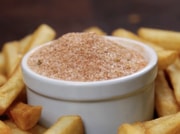Famous chef's new children's book sparks outrage, pulled from shelves
By
- Replies 43
In a world where cultural sensitivity and respect for diverse histories are increasingly recognised as paramount, even well-intentioned creative works can sometimes fail to reach the mark.
This was the case with British celebrity chef Jamie Oliver's latest children's book, which has been pulled from sale following a backlash over its portrayal of Indigenous Australians.
The book Billy and the Epic Escape was intended to be a whimsical adventure for young readers.
However, it included a subplot that has been widely criticised for being disrespectful and perpetuating harmful stereotypes about Indigenous communities.
The controversy centred around a chapter set in Alice Springs, where the story's antagonist abducts a young Indigenous girl from her foster home in an Indigenous community.
The National Aboriginal and Torres Strait Islander Education Commission (NATSIEC) led the charge in calling for the book's withdrawal, highlighting that the narrative trivialised the complex and painful histories of Indigenous child removals in Australia.
NATSIEC chief executive Sharon Davis expressed her concerns, stating that the chapter suggested Indigenous families could be 'easily swayed by money and neglect the safety of their children.'
This portrayal, according to Davis, was not only offensive but also reinforced damaging biases that have been used to justify child removals for over a century.
The outcry prompted Jamie Oliver, who was in Australia promoting his latest cookbook then, to apologise.
He expressed his devastation at offending and emphasised that he never intended to misinterpret such a harrowing issue.
In response to the backlash, Oliver and his publishers, Penguin Random House UK, decided to withdraw the book from sale.
The publisher acknowledged that consultation with Indigenous organisations or communities had yet to occur during the book's creation, admitting that their publishing standards had fallen short.
They emphasised their commitment to making books for everyone and the responsibility that comes with it, vowing to learn from the incident and take decisive action.
Indigenous children's author Cheryl Leavy commended Penguin Random House's decision to pull the book.
She saw it as an opportunity to build relationships with First Nations communities and tell more authentic and respectful stories.
She urged the publisher to work with First Nations advisers to implement structural measures to prevent such oversights in the future.
Jamie Oliver, who first rose to fame with his TV show The Naked Chef in the late 1990s, had released his first children's book, Billy and the Giant Adventure, just a year prior.
The recent incident is a stark reminder of the importance of cultural consultation and sensitivity in storytelling, especially when it involves representations of marginalised communities.

Have you encountered similar issues in media or literature? How can publishers and authors better engage with and represent diverse cultures? Let us know in the comments below.
This was the case with British celebrity chef Jamie Oliver's latest children's book, which has been pulled from sale following a backlash over its portrayal of Indigenous Australians.
The book Billy and the Epic Escape was intended to be a whimsical adventure for young readers.
However, it included a subplot that has been widely criticised for being disrespectful and perpetuating harmful stereotypes about Indigenous communities.
The controversy centred around a chapter set in Alice Springs, where the story's antagonist abducts a young Indigenous girl from her foster home in an Indigenous community.
The National Aboriginal and Torres Strait Islander Education Commission (NATSIEC) led the charge in calling for the book's withdrawal, highlighting that the narrative trivialised the complex and painful histories of Indigenous child removals in Australia.
NATSIEC chief executive Sharon Davis expressed her concerns, stating that the chapter suggested Indigenous families could be 'easily swayed by money and neglect the safety of their children.'
This portrayal, according to Davis, was not only offensive but also reinforced damaging biases that have been used to justify child removals for over a century.
The outcry prompted Jamie Oliver, who was in Australia promoting his latest cookbook then, to apologise.
He expressed his devastation at offending and emphasised that he never intended to misinterpret such a harrowing issue.
In response to the backlash, Oliver and his publishers, Penguin Random House UK, decided to withdraw the book from sale.
The publisher acknowledged that consultation with Indigenous organisations or communities had yet to occur during the book's creation, admitting that their publishing standards had fallen short.
They emphasised their commitment to making books for everyone and the responsibility that comes with it, vowing to learn from the incident and take decisive action.
Indigenous children's author Cheryl Leavy commended Penguin Random House's decision to pull the book.
She saw it as an opportunity to build relationships with First Nations communities and tell more authentic and respectful stories.
She urged the publisher to work with First Nations advisers to implement structural measures to prevent such oversights in the future.
Jamie Oliver, who first rose to fame with his TV show The Naked Chef in the late 1990s, had released his first children's book, Billy and the Giant Adventure, just a year prior.
The recent incident is a stark reminder of the importance of cultural consultation and sensitivity in storytelling, especially when it involves representations of marginalised communities.
Key Takeaways
- Jamie Oliver has withdrawn his children's book from sale due to outrage over a subplot involving Indigenous Australians that was considered disrespectful.
- The National Aboriginal and Torres Strait Islander Education Commission criticised the portrayal of Indigenous families in the book as harmful and perpetuating racist stereotypes.
- Oliver and his publisher, Penguin Random House UK, admitted to failing to consult Indigenous organisations or communities during the book's creation and apologised.
- Penguin Random House UK has committed to learning from this incident and working with First Nations advisers to prevent such occurrences.
Last edited by a moderator:








